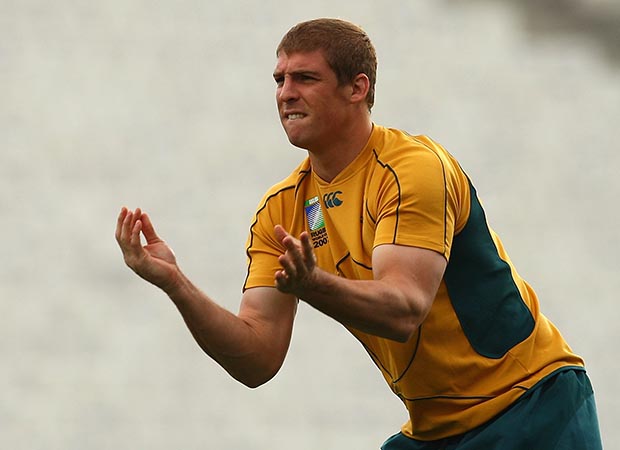 Dan Vickerman's death at the age of 37 is a reminder that being an admired and highly successful professional rugby player offers no protection from the vagaries of the human condition.
Dan Vickerman's death at the age of 37 is a reminder that being an admired and highly successful professional rugby player offers no protection from the vagaries of the human condition.
Although it has yet to be confirmed that the Wallaby lock took his own life, police reports said there were no suspicious circumstances after it was revealed that he had died at his Sydney home last weekend.
That Vickerman was playing international rugby barely more than five years ago, and leaves behind his partner, Sarah, and two small boys, makes his passing even more poignant.
From the outside the giant Cape Town-born second row, who moved to Australia at the age of 21, appeared to have everything going for him. Having made his mark with the Brumbies and the Waratahs he went on to win 63 caps for Australia and had the distinction of playing in three World Cups (2003, 2007, 2011) for his adopted country.
Vickerman had earned the respect of team-mates and opponents alike as a hugely committed powerhouse of a player who was both abrasive and effective. He had a three-year stint in England, captaining Cambridge University to victory in the 2009 Varsity match while doing a land economics degree, and also played a handful of games for Northampton.
After returning to Australia, and retiring after playing for the Wallabies in their 2011 World Cup semi-final defeat by New Zealand due to recurrent stress fractures in his right leg, he was busy carving out a career in commercial property.
However, former Wallaby flanker Owen Finegan said that Vickerman had remarked to team-mates in the Silver Foxes veterans outfit on a number of occasions that the transition from being a pro rugby player to everyday working life was a difficult one.
This is not hard to understand. Pro rugby players live in a strange bubble. It is a heady concoction of being part of a team culture in a sport which mixes huge amounts of physical and emotional commitment with intense camaraderie, all wrapped-up in support systems that are tantamount to an umbilical chord.
The payback is more money than most young blokes can shake a stick at, and cocooned culture in which most of life's essentials – such as accommodation, travel, diet, physical health – are taken care of.
An unwanted spin-off is that where physical health – especially recovery from injury – is a paramount concern in a pro rugby environment, pastoral concern, including mental health, is way down the pecking order.
This reflects attitudes in society at large, but in the rarefied atmosphere of pro rugby there is a growing recognition that pastoral care has to be a priority rather than an add-on.
This applies across the board, whether it is post-career support for high profile internationals like Dan Vickerman, or to the new reality of young players being scouted by clubs in their early teens.
At that stage learning life skills is more important than learning rugby skills. Although they are not mutually exclusive, at 13 rugby skills will serve an individual for a further 20 years – if they make the grade – whereas life skills are for life.
Another of the associated dangers of the pro rugby cocoon was highlighted by Eddie Jones during the autumn when he said there was a leadership vacuum in English rugby. He outlined that the existing system inhibits the need for initiative, and thereby stunts the development of players as independent individuals.
What is clear is that evidence of young players suffering serious mental stress is starting to go from a trickle to a stream.
The World Cup-winning Wallaby wing Ben Tune made an attempt on his life in 2009 after battling depression, while four years ago the Sale Sharks and England U20 wing Selorm Kuadey died at 24 after committing suicide.
The Bath and England prop Duncan Bell was the first high profile player to speak openly about his battle with depression and anxiety, while others have revealed their own struggles with mental health issues, the former England Sevens captain Ollie Phillips and Jono Kitto, Leicester's Kiwi scrum-half, among them.
This week the Rugby Players Association (RPA) launched its ‘Lift the Weight' campaign, encouraging players, and the families of players, who know they are suffering depression or other mental health issues, to use their counselling and medical services. This includes a 24-hour helpline.
Rugby Union encourages players to battle through adversity, but with mental health issues a sense of isolation is often the biggest enemy, and the RPA's initiative is an important response to a growing problem.


























